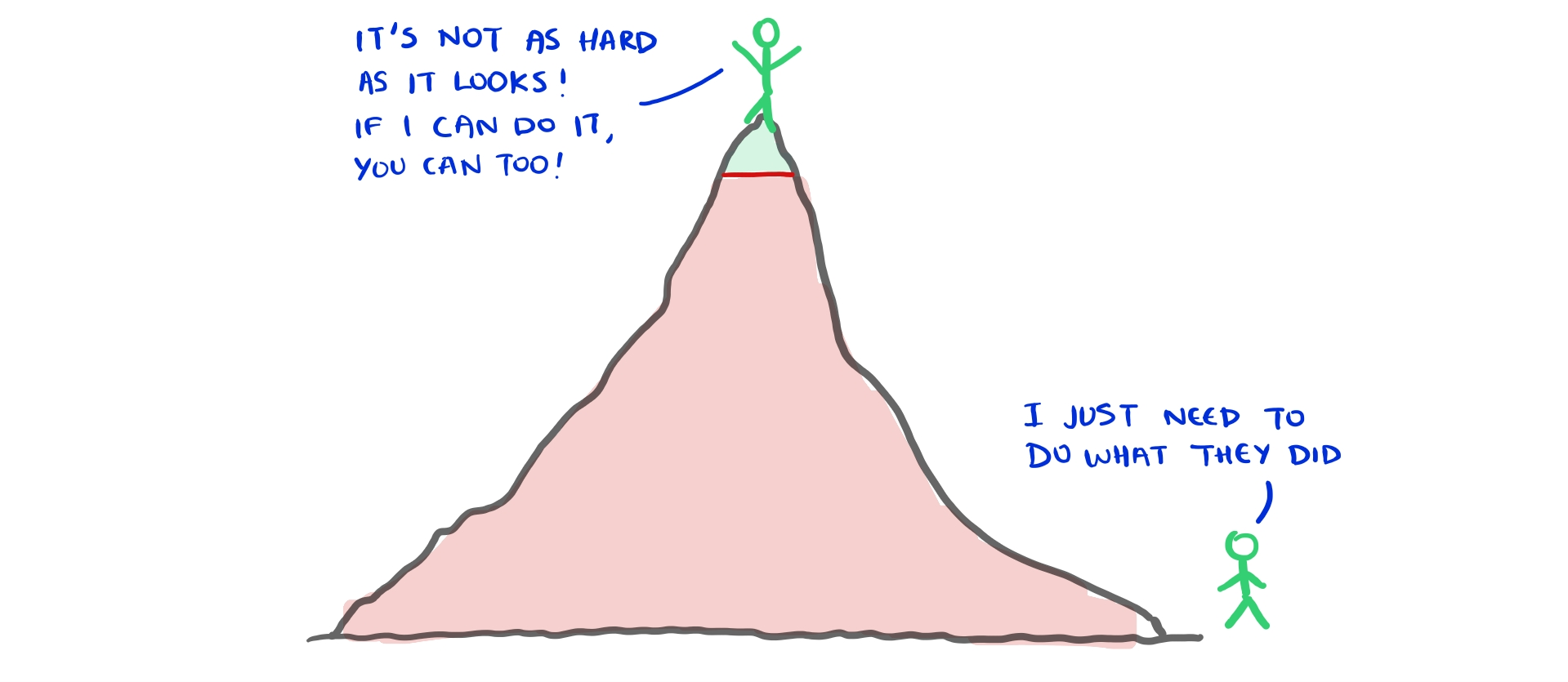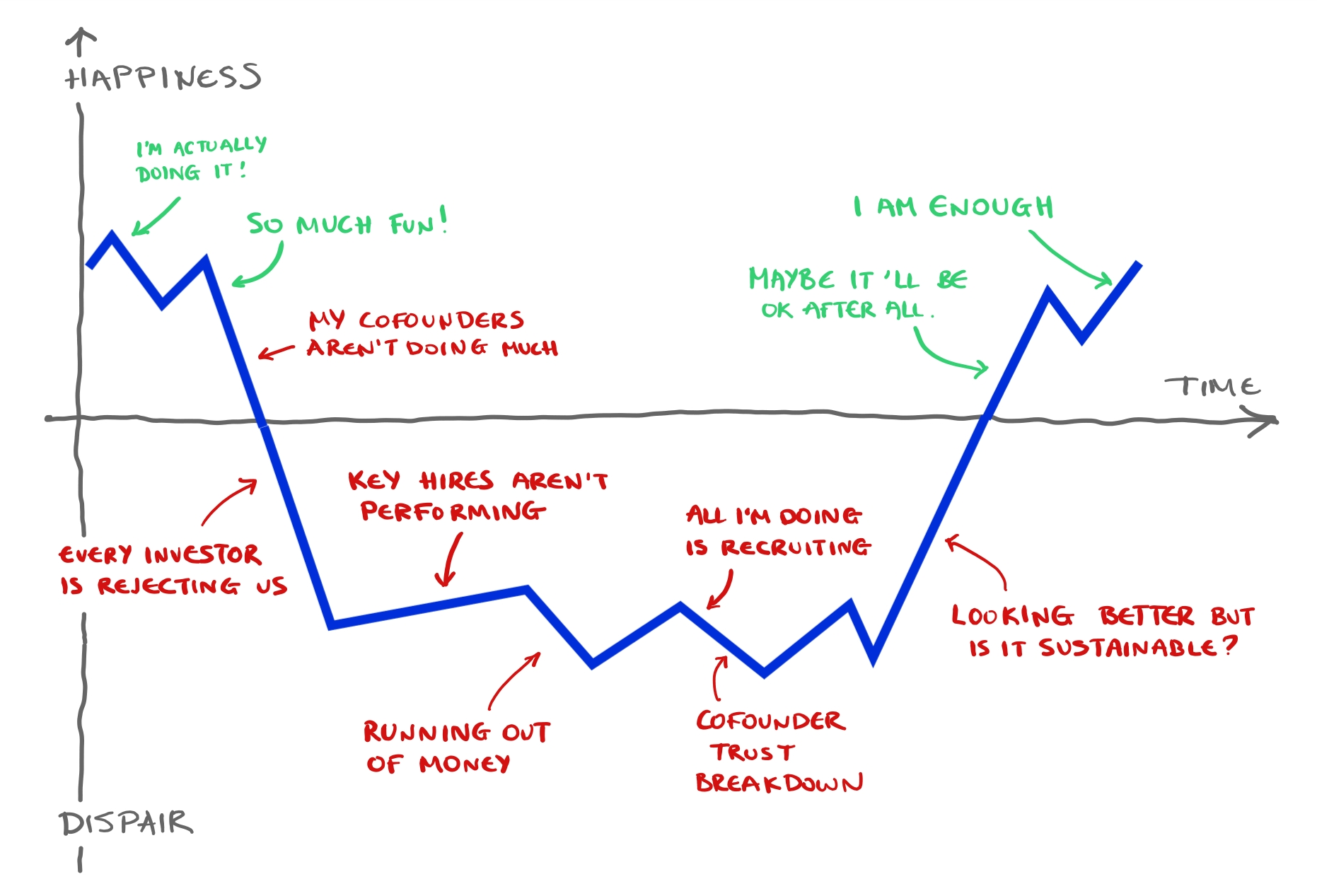The distorted reality of startup success stories

"There's always gonna be another mountain
I'm always gonna wanna make it move
Always gonna be an uphill battle
Sometimes I'm gonna have to lose…"
— Miley Cyrus
We all love inspirational, work-hard startup stories. We're moved by the life of someone following their dream — and succeeding, of course.
It's natural to enjoy reading about success. That’s why most posts, books, and podcasts focus on it. They paint a hopeful world where anything feels possible. And they make us feel good.
We need these stories to move forward, to draw strength and hope from them.

This is all good and dandy — but at the same time, it’s not the norm. The world isn’t like that. Startups are anything but straightforward.
Stories shape how we think. And when most of the stories we consume are tales of triumph, something subtle but powerful happens: we start mistaking the exception for the rule.
We absorb these stories as templates — as if success were inevitable if you just try hard enough. In doing so, we unknowingly adopt a distorted view of reality — one that can quietly set us up for burnout, disappointment, or disillusionment.
Let’s unpack a few of these distortions.
Distortion #1: The Hero's Spotlight
We mostly read about the stories of entrepreneurs who actually made it. Hard-working individuals with a laser-focused goal are universally admired. A whole continent was built on that dream.

Besides, what could we learn from the stories where the hero lost, right? These founders might be the silent majority, but they didn’t end up with a TED talk, did they?
Most advice we hear is about following your vision relentlessly, being passionate, and — in general — doing more, trying harder.
Here lies the first fallacy: that a startup without a big exit is a failure. That if you didn’t “win,” you wasted your time. As if there’s no meaning in simply trying. In building, learning, evolving.
Sports are like that: one winner, everyone else “lost.”
First prize: Glory, your name in history, wealth. Second prize? A set of steak knives.
But life isn’t like that. Winner-takes-all scenarios exist, but they’re rare. In fact, there’s often more to learn from the stumbles, the near-misses, and the quiet shutdowns — than from the rare rocket ships.
Distortion #2: The Hindsight Trap
We not only focus on the winners — we focus on the success path they took.

We trace success backward as if it were inevitable. We see the path taken and perceive it as obvious. Once someone succeeds, we retroactively stitch together a narrative that makes the choices look logical and intentional. Like there was a master plan all along.
But the journey didn't feel like that at all. The whole journey was a set of decisions, full of difficult if-then-else choices. There’s no recipe for building a successful company — only countless ways to build a failed one. Real startup journeys are messy, full of trial-and-errors and dead ends.
Distortion #3: The Filtered Struggle
Finally, when we talk about this one successful path, we often pretend (and as the audience, we buy this pretend) that it was mostly smooth all the way through.
The pain gets edited out.
Sure, happy moments exist in startup life — and they are beautiful, precious, and unique. But they are rare, and they don’t last. Peaks of inflated expectations are quickly followed by troughs of disillusionment.
Most founders’ journeys are colored by anything but positive feelings.
The struggle of managing conflicting emotions (ambition vs. realism).
The rollercoaster-like ups and downs.
The nine “no”s from customers and VCs before one “yes.”
The discomfort of the unknown.
The gut-wrenching comparison with successful CEOs and the impostor syndrome.
The midnight oil. The loneliness.

It’s inevitable to talk about the journey in a positive light after you’ve succeeded. It’s natural for us to leave behind the struggles we faced, just keep going. We have to, in order to survive. In order to perform.
And because time moves fast in startups, this usually happens through dissociation and compartmentalization — rather than through reflection and actually processing and healing along the way.
We bury the hard stuff under the rug (only to deal with the cost later).
Bodies of work that talk about the full picture, struggle included, are rare. And that’s unfortunate, because for every rosy moment, there are probably tens of thousands of hard ones.
For every empowered “Let’s try this and see where it takes us!!” moment, there are endless tough, uncertain decisions and quiet, lonely stretches where belief runs thin.
Embracing the hard
In that corny quiz — “What would you say to your younger self just starting out?” — we probably wouldn’t go on about the sunny days of startup life.
We'd tell them about the hard parts, the difficult choices and the tough moments.
We’d tell them about the importance of being curious and courageous when faced with the countless moments of indecision and doubt.
We’d draw on our inner Cavafy and tell them to hope their journey is a long one — full of adventure, full of discovery.
And we would tell them to embrace the struggle.
Because those are the moments that will shape you and your company's future.
Not the peaks — the climb.
Thanks for reading and for sharing with people you think will like the content! 🙏
Subscribe to get notified of new posts every now and then.